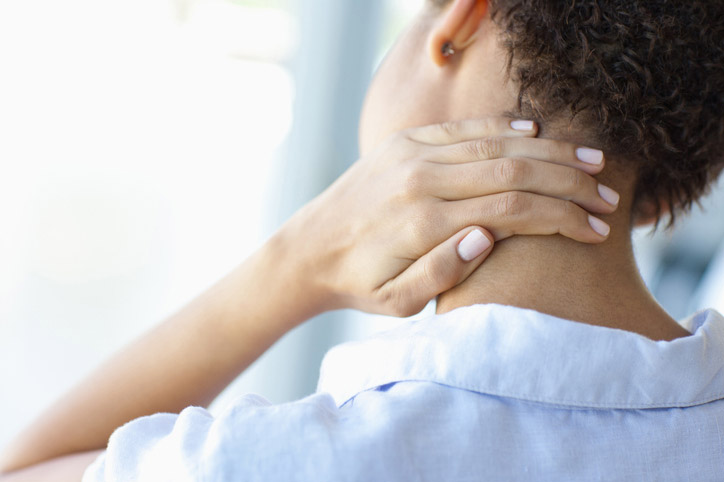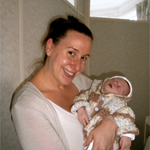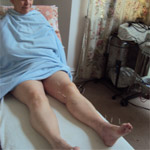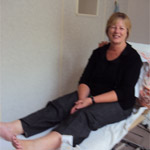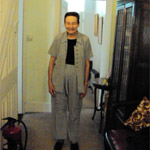Pain in the neck? Discover the common causes (and preventions) of neck pain
Poor posture, sleeping position and stress are all common culprits of neck pain. And, according to figures released by the Office for National Statistics*, it’s something around 1 million people in the UK are suffering from.
Being in pain can be a frustrating and unpleasant experience. And it can affect you both physically and mentally.
“Niggles in the neck can stop you going about your everyday tasks,” Osteopath, Denise Callaghan, says. “For example, when you’ve got a pain or strain in your neck, it can limit your range of movement, stop you from driving and/or prevent you from working altogether. But that’s why I’m on a mission to spread awareness about how neck pain is caused, and how to prevent this musculoskeletal condition from occurring in the first place.”
Talk to me about the neck
From your posterior scalene and your platysma, to your sternocleidomastoid muscle (SCM) and your trapezius — your neck is a complex structure, made up of more than 20 muscles.
Along with protecting nerves that carry sensory and motor information from the brain to the rest of the body, a well working neck enables you to turn your head and flex it in different directions.
“Your head is highly mobile and, in comparison, your neck is very small,” Denise says. “The average head can weigh anywhere between 2kg to 5kg and, along with being supported by your neck muscles, it’s balanced on just 7 vertebrae (bones) separated by shock-absorbing discs. If not properly looked after and cared for, your neck can be easily strained.”
Causes of neck pain
As we touched on, bad pillows, awkward sitting or sleeping positions and/or poor posture are all to blame for neck pain.
“I’ve seen a lot of people suffer from a wry neck (torticollis), which is when the head becomes painfully twisted to one side,” Denise explains. “While sometimes, it’s to do with simple wear and tear of the discs and small joints as we age.”
Tech neck (i.e. hunching over screens), sports injuries and/or turning too quickly can also cause a strain or tension in this region.
Another common cause can include stress and when tension builds up in the muscles at the back of the neck and shoulders, this can lead to pain and/or tension headaches.
But now for the good news
Prevention is better than cure. And thankfully, there are a number of tips and tricks to have in your health and wellbeing arsenal to help prevent neck pain.
- Stay active: It comes as no surprise to hear that exercise is one of the best things you can do for your health. And when it comes to keeping neck pain at bay, it’s no different. Exercise helps to keep muscles flexible and joints mobile. So, when sitting for prolonged periods, simple movements like carefully moving your neck from side to side, or rolling your shoulders back so they’re not hunched up to your ears, can help.
- Adopting a good posture: When standing, stand up tall and straight, with your shoulders back, your head level and your feet around shoulder-width apart. When sitting, sit upright and well back in the chair with a cushion at the small of your back. Shoulders should be in line with your hips and draw your chin back. If you’re on a screen, have your computer or phone at eye level. And if you’re using a phone, hold it to your ear, rather than use your shoulder to do so.
- Invest in a quality backpack: It can be tempting to use tote bags or handbags to carry all your must-haves. But all that heavy lifting on one side can irritate your shoulders and neck. Instead, if you’re carrying a heavy load, invest in a quality backpack that distributes the weight evenly.
- Stay hydrated: The NHS recommends drinking between 6–8 cups of fluids a day, which is roughly 1.5–2 liters — and for good reason. The discs between the vertebrae in the spine have a high-water content. Hydrating yourself with plenty of water ensures they (and you) stay healthy and happy.
Treatments to help with neck pain
If you do find yourself in the unfortunate position of having neck pain, there are a number of tried and tested Osteopathic treatments that can help.
- Osteopathy. This involves the massage and manipulation of locked joints. Osteopathy can help relieve the neck from stiffness.
- Electrotherapy and ultrasound. Electrotherapy and ultrasound work to reduce inflammation, stiffness of joints and decrease muscle spasm while improving blood and lymph supply.
- Acupuncture. Acupuncture works by stimulating certain pressure points within the body. The stimulation of these pressure points releases endorphins and allows the free flow of energy to continue. It’s been used for more than 3000 years to help maintain the body’s overall balance.
Get in touch
If you are struggling with neck pain, and have been in pain for the past couple of days (or more), please don’t suffer in silence. Denise Callaghan is a member of the British Acupuncture Council and The British Medical Acupuncture Council and has more than 35 years’ experience in the field. She has helped a number of clients overcome this bothersome injury. Get in touch here.

